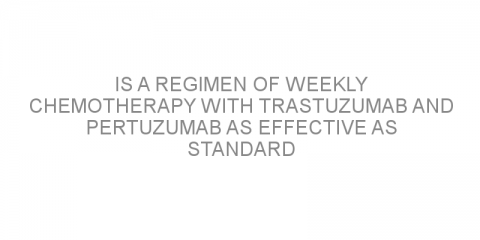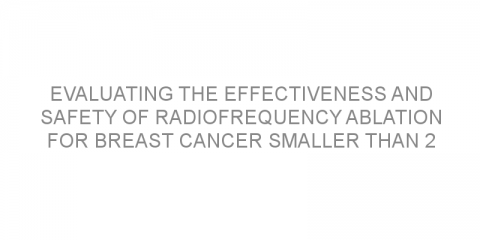In a nutshell This study examined the use of paclitaxel (Taxol) and carboplatin (Paraplatin) as weekly chemotherapy (CT) with trastuzumab (Herceptin) and pertuzumab (Perjeta) in HER2+ breast cancer (BC) in order to reduce toxicity rates. The authors found that the weekly regimen of chemotherapy can be considered an alternative to standard chemotherapy...
Read MoreBreast cancer Posts on Medivizor
Evaluating olaparib for patients with BRCA1/2-positive breast cancer
In a nutshell This study looked at the use of olaparib (Lynparza) treatment for patients with high risk, BRCA1/2-positive, HER2-negative breast cancer (BC). The authors found that in patients with BRCA1/2-positive BC, olaparib after local treatment improved the outcomes of these patients. Some background BC is one of the most common cancers...
Read MoreAromatase inhibitors versus tamoxifen following chemotherapy for perimenopausal women with breast cancer
In a nutshell This study was carried out to assess the use of aromatase inhibitors (AI) versus tamoxifen (Novaldex) for women before menopause with estrogen receptor-positive (ER+) breast cancer (BC). The authors found that AIs were associated with better outcomes than tamoxifen in these patients. Some background About 80% of all BCs...
Read MoreDoes neratinib plus capecitabine benefit patients with HER2-positive breast cancer spread to the central nervous system?
In a nutshell This study compared the safety and effectiveness of neratinib (Nerlynx) plus capecitabine (Xeloda) versus lapatinib (Tykerb) plus capecitabine in patients with human epidermal growth factor (HER2)-positive breast cancer (BC) spread (metastases) to the central nervous system (CNS; brain and spinal cord). The data showed that the...
Read MoreIs pyrotinib with vinorelbine effective in treating HER2+ metastatic breast cancer?
In a nutshell This study was carried out to examine the safety and effectiveness of pyrotinib (Irene) in combination with vinorelbine (Navelibine) is in treating metastatic breast cancer (BC). The authors found that this treatment combination showed promising results and was well tolerated in these patients. Some background BC is...
Read MoreMental effects and depression induced by taxane-based chemotherapy in breast cancer survivors
In a nutshell This study aimed to investigate depression and cognitive (thinking and reasoning) functions after taxane-based chemotherapy in patients with breast cancer. This study concluded taxane-based chemotherapy commonly leads to cognitive impairment in these patients, but some functions improve or remain stable after stopping...
Read MoreDoes exercise increase recovery in patients undergoing surgery for breast cancer?
In a nutshell This study was carried out to examine the impact of physical activity (PA) on the recovery of patients having surgery for breast cancer (BC). The authors found that PA reduces the risk of patients developing chronic pain and women who had higher levels of PA recovered better than sedentary women. Some background BC is one of...
Read MoreWhat is the best timing for chemotherapy after surgery in patients with early-stage breast cancer?
In a nutshell This study looked at the timing of chemotherapy (CT) after surgery in the treatment of early breast cancer (BC). The authors found that CT given within 31 days after surgery may improve survival in patients with triple-negative (TN) BC. Some background BC is one of the most common types of cancer found in women. There are...
Read MoreComparing the safety and effectiveness of pyrotinib versus trastuzumab etamsine for the treatment of HER2-positive metastatic breast cancer.
In a nutshell This study compared the safety and effectiveness between pyrotinib (SHR-1258) and trastuzumab emtansine (T-DM1; Kadcyla) in patients with HER2+ metastatic breast cancer (BC) after previous treatment with trastuzumab (Herceptin) and chemotherapy. The data showed that pyrotinib may be more effective than T-DM1 for these patients. Some...
Read MoreEvaluating the effectiveness and safety of radiofrequency ablation for breast cancer smaller than 2 cm.
In a nutshell This study evaluated the effectiveness and safety of radiofrequency ablation (RFA) for breast cancer (BC) smaller than 2 cm. The data showed that RFA was safe and effective in these patients. Some background Radiofrequency ablation (RFA) is a medical procedure where pieces of tissue are removed using the heat that is produced from an...
Read MoreEffects of adherence to homone therapy after surgery and radiation on the outcomes of older patients with early-stage breast cancer
In a nutshell This study aimed to investigate the effects of adherence to hormonal therapy (HT) and radiation on the outcomes of older patients with early-stage breast cancer (BC). This study concluded that the lack of adherence to HT and omitting radiation can lead to poorer outcomes for these...
Read MoreCould patient-reported outcomes predict survival benefits in patients with advanced breast cancer treated with abemaciclib?
In a nutshell This study evaluated the association between patient-reported outcomes (PROs) and survival outcomes in patients with hormone receptor-positive (HR+)/HER2-negative (HER2-) advanced breast cancer (BC) treated with abemaciclib (Verzenio). The data showed that the PROs could be a predictor of survival benefits in these patients. Some...
Read More














